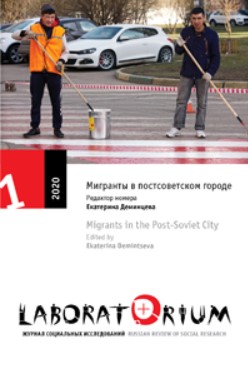Видимо-невидимо: миграция и трансформация языкового ландшафта Санкт-Петербурга
Growing Visibility: Migration and Transformations in Saint Petersburg’s Linguistic Landscape
Author(s): Kapitolina Fedorova, Vlada BaranovaSubject(s): Sociolinguistics, Migration Studies, Ethnic Minorities Studies
Published by: Центр независимых социологических исследований (ЦНСИ)
Keywords: Multilingualism; Linguistic Landscape; Migrants’ Languages;
Summary/Abstract: Transformations in the linguistic makeup of Russian cities resulting from massive— in comparison with the Soviet period—migration of nonnative speakers, often with low proficiency in Russian, can be fast; acknowledgement of these transformations by society, however, demands more time. Attitudes to actual urban multilingualism are determined by the domineering monolingual ideology demanding communication only in Russian. The social inequality of native and nonnative speakers becomes apparent if we consider how different languages spoken in the city are reflected in its linguistic landscape, in other words, different written signs, both formal and informal. Saint Petersburg’s linguistic landscape underrepresents the languages of labor migrants; on the rare occasions when these languages are used, signs in Chinese (not targeting Chinese tourists) and in Uzbek can be found in places hidden from the eyes of general public. However, this trend is gradually changing; new practices drawing local citizens and migrants into interactions are emerging. This article aims at revealing the situations making migrants and their multilingual existence visible to the receiving community; it focuses not on the exclusion of migrants from the linguistic landscape but rather on new developing practices of contact and urban domains favoring such practices. The article is based on Saint Petersburg’s linguistic landscape (signs, unofficial announcements, advertising, etc.) as a primary source; as additional sources it uses interviews with labor migrants and focus groups with local citizens discussing multilingual communication, everyday linguistic practices, and public representation of languages in urban space. Ethnographic linguistic landscape analysis (ELLA), focusing on the context of communication, is used as a methodological approach to analyzing the data.
Journal: Laboratorium. Журнал социальных исследований
- Issue Year: 12/2020
- Issue No: 1
- Page Range: 48-80
- Page Count: 33
- Language: Russian

